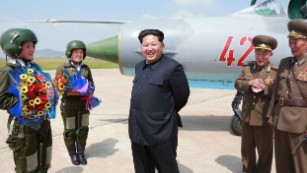Seoul, South Korea – North Korea and South Korea have reached an agreement to de-escalate tensions on the Korean Peninsula, South Korea’s national security chief, Kim Kwan-jin, announced Tuesday.
South Korea will get the apology it demanded over recent military escalation by the North, and the South will stop broadcasting propaganda that infuriated the North.
North Korea says it “regrets” that South Korean soldiers were injured by landmines and lifts its “semi-state of war” under an agreement by the two countries, the Yonhap News Agency reported.

South Korea will stop its propaganda broadcasts over the border on Tuesday, Kim said.
“I wish that we can build the new South and North Korea relationship that our people (wish for) by sincerely carrying out the agreed issues and building trust through dialogue and cooperation,” he said. “During the meeting, it is very meaningful in the aspect that the North apologized over the landmine incident and that they agreed on making efforts to prevent such incidents from reoccurring and easing tension.”
North Korea, through its state-run Korean Central News Agency, confirmed an agreement had been reached.
South Korean President Park Geun-hye had demanded Pyongyang apologize for recent provocations, including landmine blasts that badly wounded two South Korean soldiers this month.
“This is a matter of national security and safety of our people,” she said. “This is not a matter where we can back down, even if North Korea maximizes its provocations and threatens security like it did in the past.”
The mines, which exploded in the Demilitarized Zone that separates the two countries, set off an antagonistic spiral. South Korea, a key U.S. ally, responded by resuming propaganda broadcasts over the border for the first time in more than a decade, a move that infuriated Kim Jong Un’s regime.
North Korea fired shells over the DMZ on Thursday, apparently aimed at the loudspeakers blaring the messages, setting off a brief exchange of fire.
Marathon talks
Marathon talks between the two longtime foes took place in Panmunjom, an abandoned village in the DMZ that now serves as a site for inter-Korean meetings.
Under the agreement, additional talks between the two countries will take place soon in Seoul or Pyongyang.
Park had said earlier that the loudspeaker broadcasts would continue unless North Korea apologized for the recent provocations. Pyongyang had denied it planted the mines or started the exchange of fire Thursday.
Pyongyang’s mixed messages
The tense situation highlighted the mixed messages Kim’s government gives off during unpredictable bouts of brinkmanship.
At the same time as it was sending top envoys to talk to the South, the secretive regime was also pumping out its notorious brand of ominous-sounding propaganda.
“Let us destroy the warmongering South Korean puppet military!” an anchor on North Korean state television announced as a second round of negotiations between the two sides began Sunday.
It was followed by clips of uniformed young men holding up a sign that read, “Death to U.S. imperialists,” followed by them signing a pledge to destroy the United States.
Such scenes are typical on North Korea’s only television channel, but Sunday’s fare appeared to have less variety than usual. Music breaks featured all-military orchestras — there were no children or civilians playing.
‘Depressing regularity’ of skirmishes
Adding to the uncertain backdrop of the talks, North Korea doubled its artillery forces on the front lines and 70% of its submarine units left their bases, a South Korean Defense Ministry official said.
